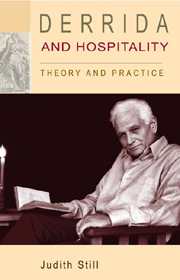Book contents
- Frontmatter
- Contents
- Acknowledgements
- Abbreviations
- 1 Introduction to the question of hospitality: ethics and politics
- 2 Patriarchs and their women, some inaugural intertexts of hospitality: the Odyssey, Abraham, Lot and the Levite of Ephraim
- 3 Friendship and sexual difference: hospitality from brotherhood to motherhood and beyond
- 4 Frenchalgeria – (not) asking for a name, naming, calling by name in tales of Algerians
- 5 The dangers of hospitality: the French state, cultural difference and gods
- 6 Animals and what is human
- 7 Concluding around hospitality
- Bibliography
- Index
2 - Patriarchs and their women, some inaugural intertexts of hospitality: the Odyssey, Abraham, Lot and the Levite of Ephraim
Published online by Cambridge University Press: 12 September 2012
- Frontmatter
- Contents
- Acknowledgements
- Abbreviations
- 1 Introduction to the question of hospitality: ethics and politics
- 2 Patriarchs and their women, some inaugural intertexts of hospitality: the Odyssey, Abraham, Lot and the Levite of Ephraim
- 3 Friendship and sexual difference: hospitality from brotherhood to motherhood and beyond
- 4 Frenchalgeria – (not) asking for a name, naming, calling by name in tales of Algerians
- 5 The dangers of hospitality: the French state, cultural difference and gods
- 6 Animals and what is human
- 7 Concluding around hospitality
- Bibliography
- Index
Summary
If the readability of a legacy were given, natural, transparent, univocal, if it did not call for and at the same time defy interpretation, we would never have anything to inherit from it.
(Derrida, Specters of Marx, 17)(Si la lisibilité d'un legs était donnée, naturelle, transparente, univoque, si elle n'appelait et ne défiait en même temps l'interprétation, on n'aurait jamais à en hériter. (Derrida, Spectres de Marx, 40))
This chapter will not attempt to trace the history of the concept or the practice of hospitality, which would require at least a book, better several books, in itself. I have analysed aspects of eighteenth-century hospitality, as a particular pressure point, in Enlightenment Hospitality. Here I shall give space to an analysis of some very particular key texts relating to hospitality which seem to haunt the present, or which act as nodal points crossed by the tensions that still beset us today, episodes from the Odyssey and from the Books of Genesis and Judges in the Old Testament. I shall go on to discuss briefly the nostalgic relationship of discourses about hospitality in general to the (text of the) past (a form or structure) which means that the past anxiously inhabits the present text. This past can equally be figured as an ‘elsewhere’, which can be found for instance in praise for (nomadic) Arab hospitality. Finally I shall argue that intertextuality can be understood in terms of textual hospitality, and thus also inhospitality, just as much as discourses about hospitality self-consciously refer to a legacy.
- Type
- Chapter
- Information
- Derrida and HospitalityTheory and Practice, pp. 51 - 92Publisher: Edinburgh University PressPrint publication year: 2010



